Responsible, Short-Term Budget & Comprehensive COVID-19 Relief
Senate Approves Budget & COVID-19 Funding Package
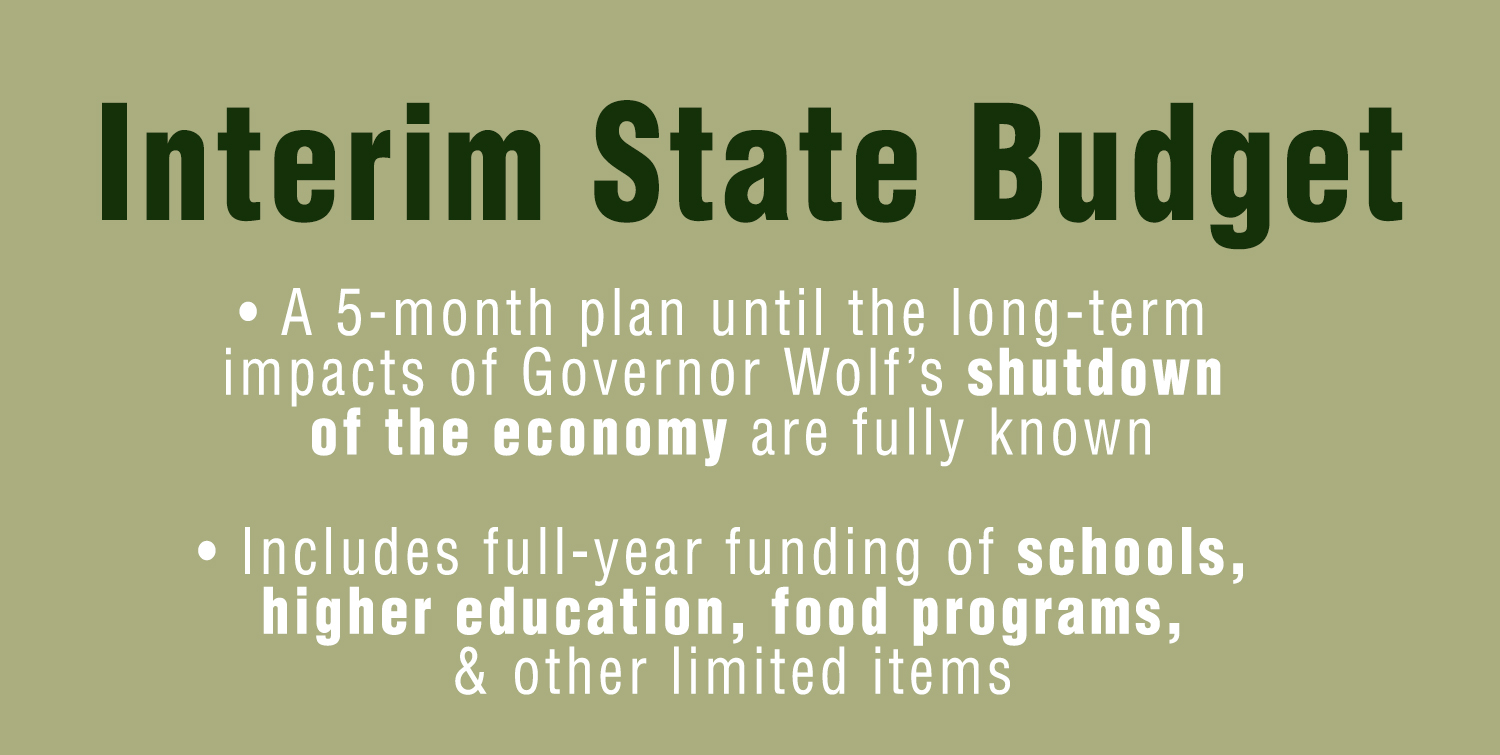
Facing an uncertain economic future and working to address the devastating impact of COVID-19, the Senate set a course for recovery by approving a $25.8 billion interim state budget as well as a plan to direct $2.6 billion in federal CARES funding to support individuals, small businesses, organizations and county governments that were most severely impacted by the virus.
The interim budget will fund critical state services until the long-term impacts of Governor Wolf’s shutdown of the economy are fully known and more accurate fiscal projections can be made. The CARES funding will help mitigate the damage done.
House Bill 2387 is an interim spending plan that provides five months of funding for most state agencies and services for FY 2020-21. The appropriations in HB 2387 are based primarily on current funding for agencies and services in the Fiscal Year 2019-20 budget, but allocated at a five-month level. Full-year funding is provided for a few select line items in HB 2387, notably for education and food security programs.
Senate Bill 1108 appropriates a portion of Pennsylvania’s federal CARES (Coronavirus Aid, Relief, and Economic Security) funding for critical needs created by the COVID-19 pandemic.
WATCH: Senate Republican Leaders Discuss Budget & Cares Funding
Interim 2020-2021 State Budget
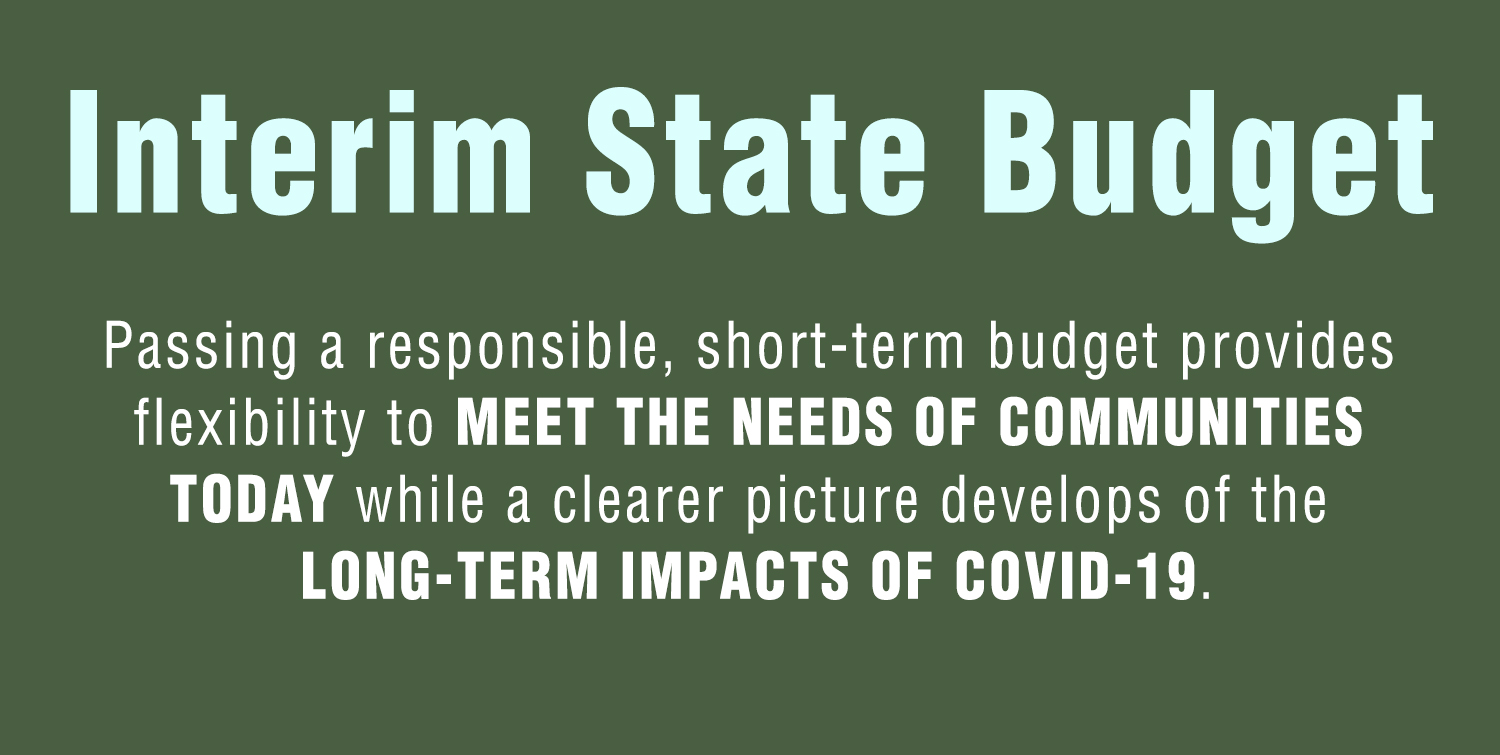
- In these uncertain times it is impossible to determine the state’s fiscal outlook over the next few months, let alone a year from now. Our primary focus must be on rebuilding Pennsylvania in the wake of this deadly virus and the resulting statewide closure of our economy.
- If the General Assembly moved forward with a full-year budget without knowing the full impact of this virus and Governor Wolf’s shutdown on our economy, we risk creating an extraordinary budget deficit that could lead to reduced services and higher taxes for years to come.
- A major concern with implementing a full-year appropriations budget now without a clearer full fiscal year financial picture for the Commonwealth is it provides a very risky potential for the Governor to request a large supplemental budget to cover significant shortfalls if revenue projections are unrealized.
- Passing a lean, responsible, short-term budget now provides the flexibility to meet the needs of our communities today while we get a clearer picture of the long-term impacts of this virus in the future.
- We need to do everything in our power as a Commonwealth to get the state back to work. The unprecedented number of workers idled by the pandemic shows how deeply this coronavirus impacted Pennsylvania families. It stressed job-creators and households and completely overwhelmed our unemployment compensation system.
- Even amid the tremendous uncertainty that comes with budgeting during a pandemic, Senate Republicans believe it is essential that we provide a full-year funding commitment to education at all levels.
- Funding for basic education, special education, early education and higher education is maintained at current levels.
- By maintaining state funding at current levels, we are reassuring school administrators, teachers, students and families that during these uncertain financial times education remains a top priority and our support is unwavering.
- This interim budget also makes a full-year financial commitment for a variety of food security programs including state food purchasing, farmers markets and school food service The COVID-19 pandemic clearly showed the importance of these programs. This full-year funding will ensure that we keep those basic food security safety net programs in place.
Senate Allocates Federal CARES Act Funding
A package of bills advanced by the Senate allocates $2.6 billion in federal COVID-19 (CARES) funding for county governments, community service providers, first responders and food banks that have been impacted by the virus. Senate Bill 1108 appropriates the funding for these critical needs, while Senate Bill 1122 and House Bill 2510 provide further direction on how Commonwealth agencies are to distribute the funding.
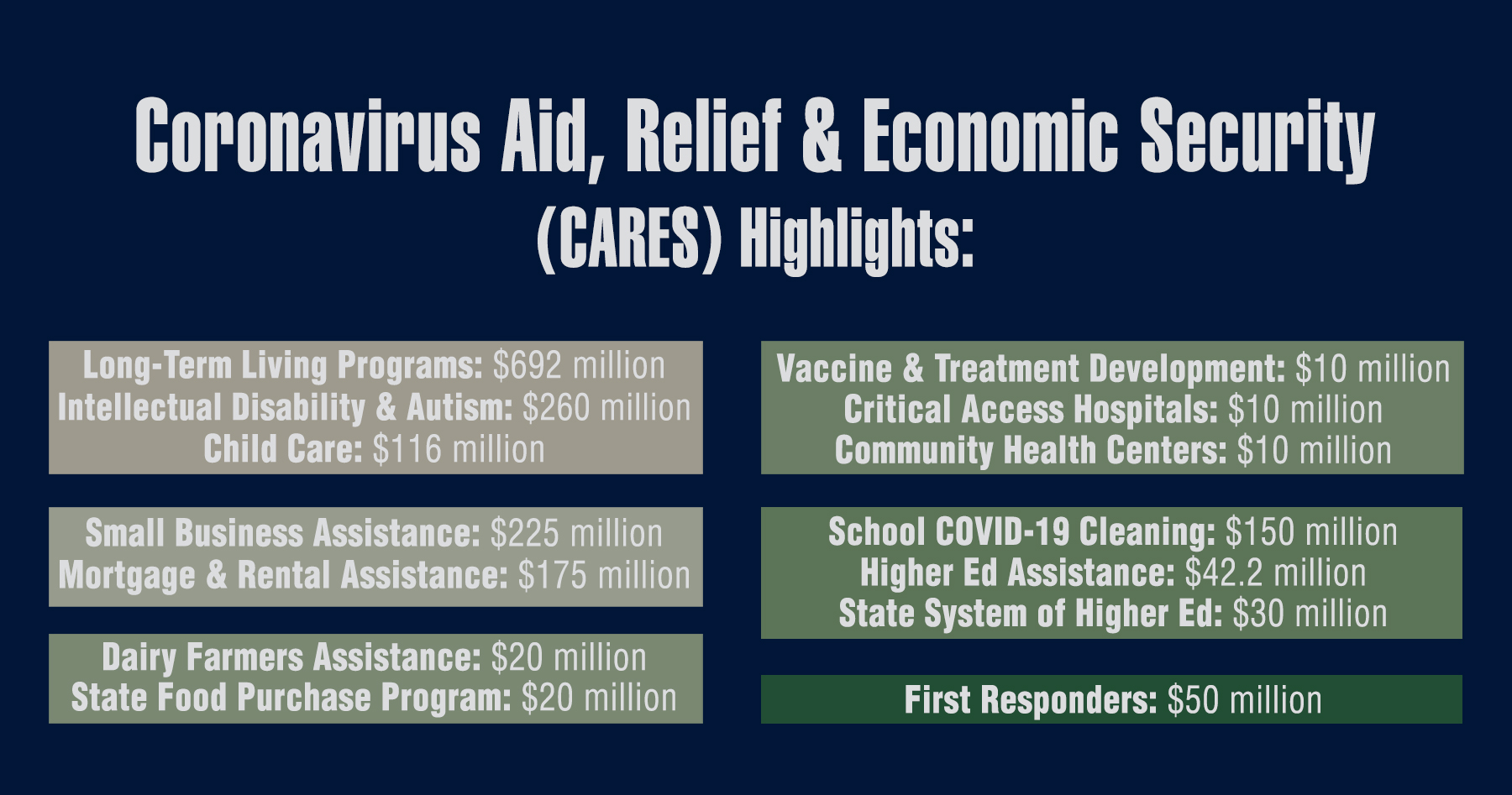
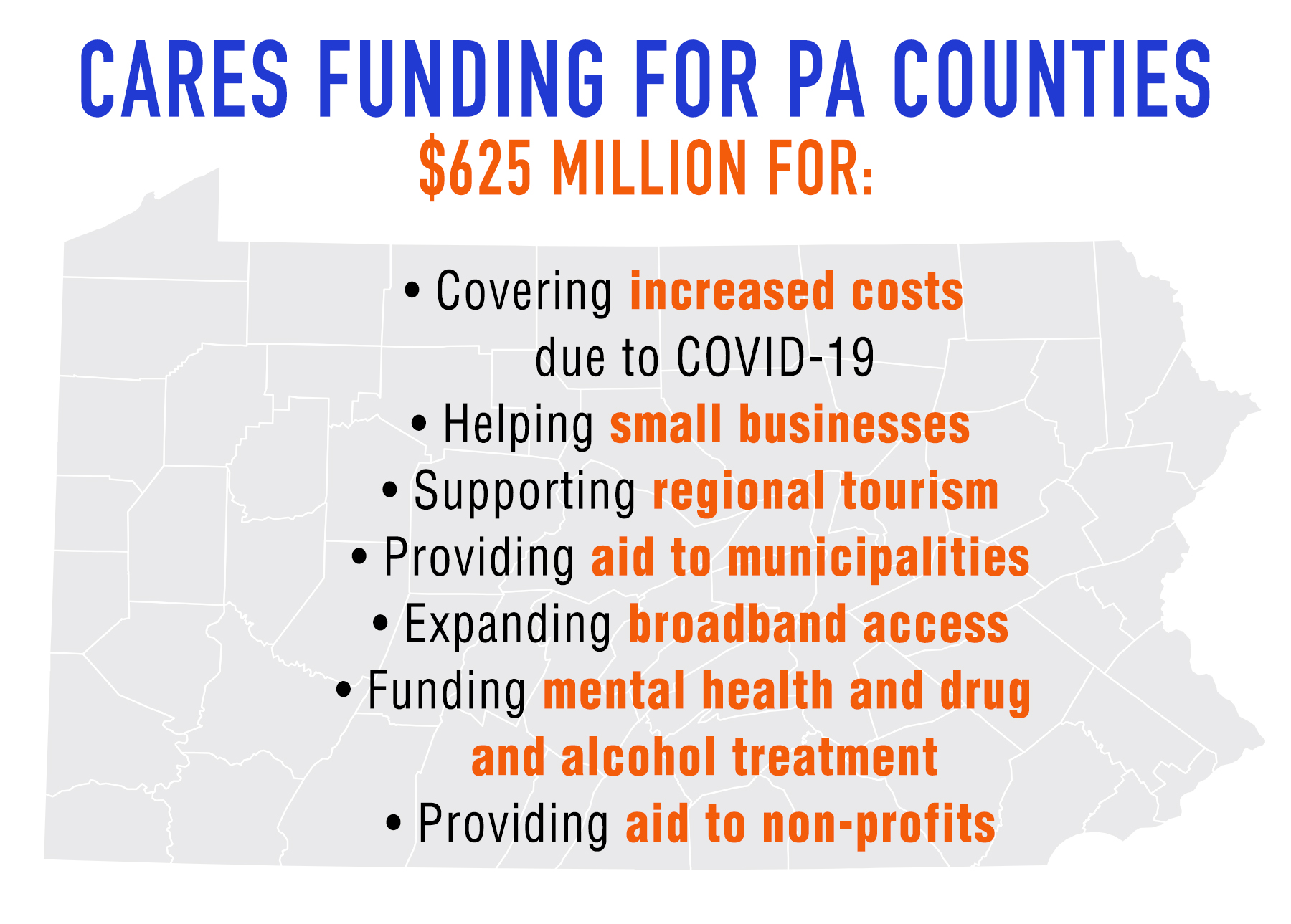
- Senate Republicans have continuously stressed the need to work closely with county leaders throughout the COVID-19 crisis and now as we move through the reopening process. These leaders are in the best position to understand the impact that the coronavirus has had on their communities and the agencies that provide essential services to their citizens.
- With that at the forefront, we are providing $625 million to 60 counties across the Commonwealth and giving them the flexibility to determine the best uses for that money.
- Counties can use their share of the funding to:
-
- Cover increased costs due to COVID-19. Government at all levels has been impacted by the virus, and as such counties can use their funding to address those costs and thereby helping to alleviate budget shortfalls due to unexpected COVID-19 costs and loss in revenues due to the stay-at-home order.
- Provide small business assistance. The statewide closure orders placed a severe financial burden on small businesses. Counties can set up their own small business assistance programs or work through business development agencies, such as Community Development Financial Institutions, to invest these funds in ways that will have the best economic impact in their communities. Additionally, counties can provide assistance to their economic development partners (CEDOs, LDDs, IRCs, SBDCs and Economic Development Corporations) who were instrumental in helping businesses impacted by the shutdown.
- Provide tourism industry assistance. Since tourism, a key economic driver throughout the Commonwealth, has been severely impacted by COVID-19, counties can provide funds to support this important industry.
- Aid to municipalities. Like the state and counties, municipalities have not been immune from the devastation caused by COVID-19. In fact, municipalities across the Commonwealth have been at the front lines of the battle against the virus, often placing a heavy burden on the services they provide. Counties are given the ability to provide essential support to help those communities recover and move forward.
- Broadband expansion. Expanding broadband access across the Commonwealth continues to be a top priority for Senate Republicans. The virus has stressed the need to expedite the process of expanding broadband access to unserved and underserved areas to ensure our children have the ability to access remote learning and our health care providers can provide telehealth services to those in need.
- Behavioral Health and Substance Use Disorder programs. The extended stay-at-home orders have intensified the issues surrounding depression and substance use disorders as county officials have noticed an increase in suicides and overdose deaths in many parts of Pennsylvania. County officials can use a portion of their funding to address those serious problems.
- Non-profit organizations. As unemployment numbers increased, many families across Pennsylvania found themselves relying on the “safety net” provided by these organizations. Across the state, many non-profit organizations were the unsung heroes of their communities as they provided vital assistance when the need was the greatest. That aid came at a cost, and counties will be able to provide a “helping hand” to the many groups that were there to provide a “helping hand” to so many citizens.
Supporting Pennsylvania Small Businesses
- One of our primary objectives in investing the federal money must be to help our small businesses in the wake of the COVID-19 outbreak and Governor Wolf’s statewide closure of our economy. Certainly, the closure has had a devastating impact on many businesses and some may never recover. That impacts families and communities across the state.
- The CARES funding package dedicates $225 million toward providing essential assistance to help small businesses across Pennsylvania as they recover from the pandemic and return to being the backbone of our state economy.
Lifeline for Long-term Living Programs
- Ground Zero of the COVID-19 outbreak was Pennsylvania’s long-term living services and programs as the deaths from the virus primarily involved the elderly and those with chronic diseases and illnesses.
- Nursing homes and long-term care facilities were — and continue to be — significantly and tragically at the epicenter of this crisis, creating unimaginable stress for staff, residents and families.
- Recognizing that, the CARES funding package provides $692 million for long-term living programs including: nursing homes ($245 million); heath collaboratives ($175 million); personal assistance services ($140 million); assisted living centers and personal care homes ($50 million); Community HealthChoices managed care organizations ($50 million); adult day services ($13 million); LIFE providers ($10 million); and, residential habilitation ($1 million).
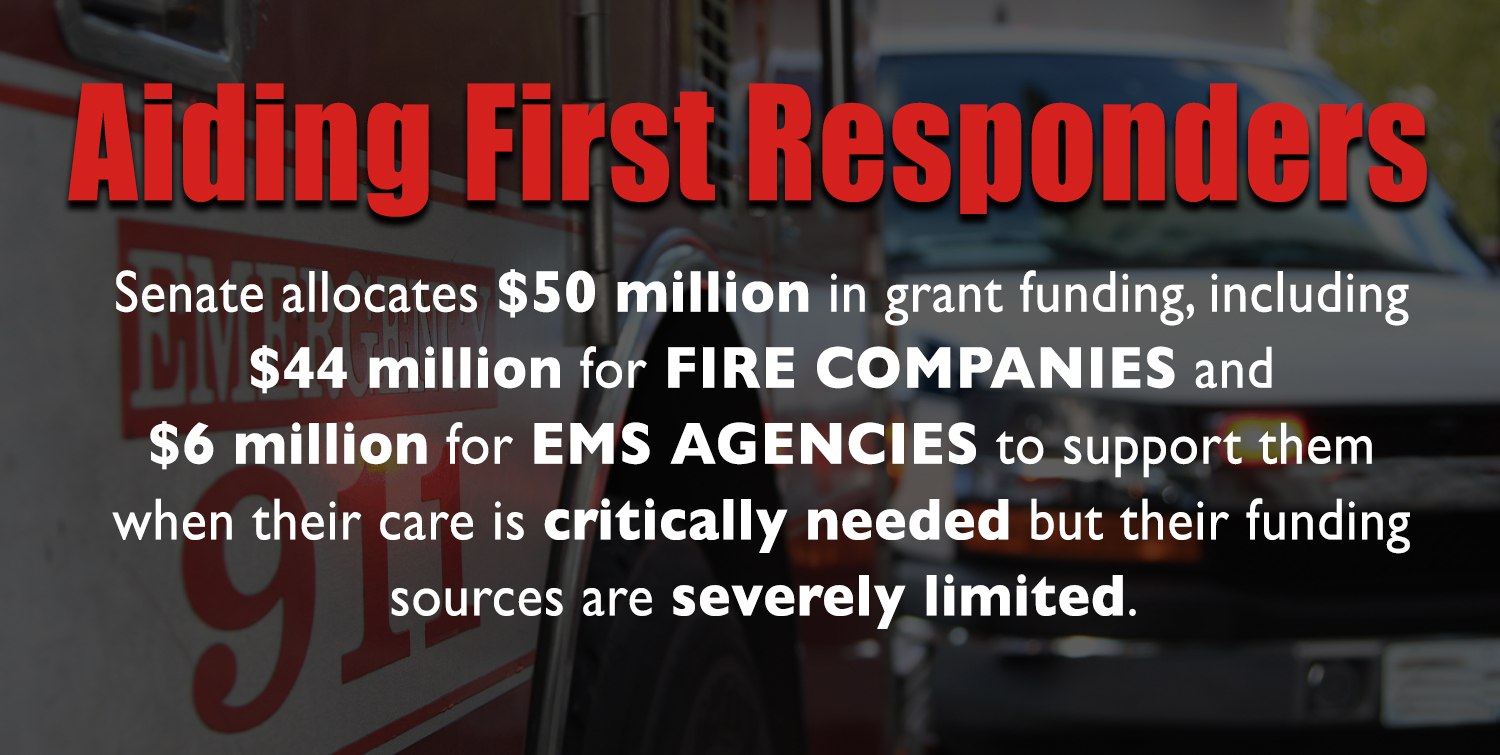
- Senate Republicans recognize that during this crisis – as is often the case during most emergencies – Pennsylvania’s fire departments and EMS stations provide lifesaving services in communities across the state.
- Many of these great organizations struggle financially under normal circumstances and the current situation, with increasing costs and the limited ability to fundraise, has certainly exacerbated that need. Senate Bill 1122 provides for a one-time grant to each fire and EMS Company to augment the ones previously approved by PEMA and the Office of the State Fire Commissioner for the 2019-20 Fiscal Year.
- Senate Bill 1122 provides for the allocation of $50 million in grant funding, $44 million for fire companies and $6 million for EMS stations, as a way to support those organizations and tangibly thank them for the important lifesaving services they provide.
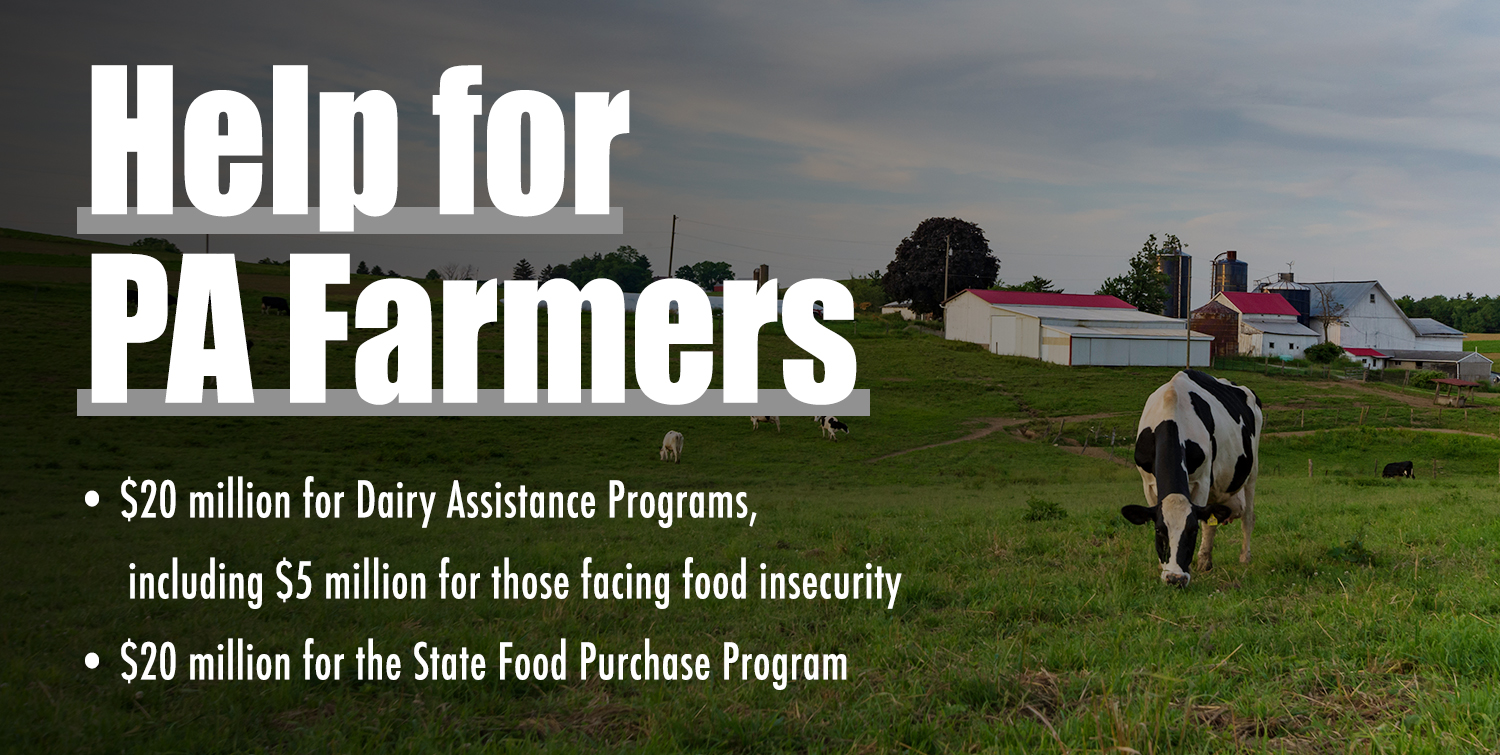
- Working to assist Pennsylvania’s farming community continues to be a top priority for Senate Republicans. The COVID-19 pandemic severely impacted Pennsylvania’s dairy farmers and highlighted the importance of state programs that address food insecurity issues.
- Senate Bill 1108 specifically allocates $20 million for dairy assistance programs, with $5 million of that money focused on support for dairy commodities for those facing food insecurity. Unfortunately, there were far too many occasions during the crisis where dairy farmers were forced – through absolutely no fault of their own – to dump the milk produced on their farms. Many dairy farms were already financially distressed before the pandemic, and the crisis certainly exacerbated those problems. These funds are intended to provide vital assistance to keep those farms as viable components of Pennsylvania’s number-one industry.
- The bill also allocates $20 million for the State Food Purchase Program, with $5 million of those funds dedicated to supporting the Pennsylvania Agriculture Surplus System as a way to support Pennsylvania’s farmers while addressing food insecurity issues.
Providing Mortgage and Rent Assistance
- Basic housing issues, such as paying the monthly mortgage or rent, are now a major concern for millions of Pennsylvanian unemployed as a result of the virus and the many more who have seen drastic decreases in their income.
- The CARES package provides important assistance to low- and middle–income families by investing $175 million through the Pennsylvania Housing Finance Agency to provide rent ($150 million) and mortgage ($25 million) assistance.
- The program would provide monthly mortgage assistance, up to $1,000, and rent assistance, up to $750, to those who lost their job or experienced a 30 percent or more loss in pay as a result of the coronavirus.
- Funding distributed in the program will be paid directly to the mortgage company or the landlord.
School Districts and Higher Education Students
- While the interim state general fund budget provided year-long state support for education at all levels, it didn’t address the additional burden that COVID-19 placed on Pennsylvania’s school districts and future, current and graduated college students.
- The virus created a whole new set of issues for school districts as they face new standards to ensure and protect the health of their students. The CARES package provides $150 million for school districts across the Commonwealth to undertake efforts such as deep-cleaning, repairs and retrofitting that are needed to ensure the safety of their students.
- Also funded through the CARES package is $9 million for early childhood education ($7 million for Pre-K Counts and $2 million for Head Start Supplemental Assistance.
- The COVID-19 pandemic derailed the spring academic schedule for all of Pennsylvania’s institutions of higher learning and their students. Colleges and universities are now facing a similar issue for the fall, which creates serious issues for them as well as anxiety for their students.
- A total of $77.2 million in CARES funds will benefit college students – $30 million for the State System of Higher Education and $42 million to PHEAA for grants to students ($30 million), institutional assistance grants ($5 million), higher education for the disadvantaged ($5 million) and student loan interest forbearance ($2.2 million). Additional funds were transferred to allocated more than $200 million for schools to response to the pandemic.